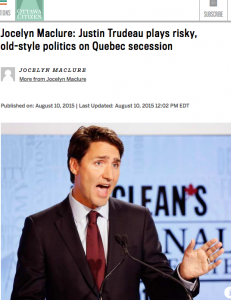I ride the subway in Toronto several times a week, and have done so for the past 10 years. I have seen a woman wearing a niqab precisely once. She was about 60-70 years old, and appeared to be taking her grandchildren to the museum. But do you know what I see a lot of? I see a lot of this:

This is in fact a big fashion trend:

Stores sell them in all sorts of colours and styles:

It is sad to think that people will no longer be allowed to wear surgical masks on the Montreal subway, or on buses anywhere in Quebec. I did not realize that it had become such a major social problem. Nevertheless, it seems to me that banning them is a bit of an overreaction on the part of the Couillard government.
Backgrounder here.… Continue reading

